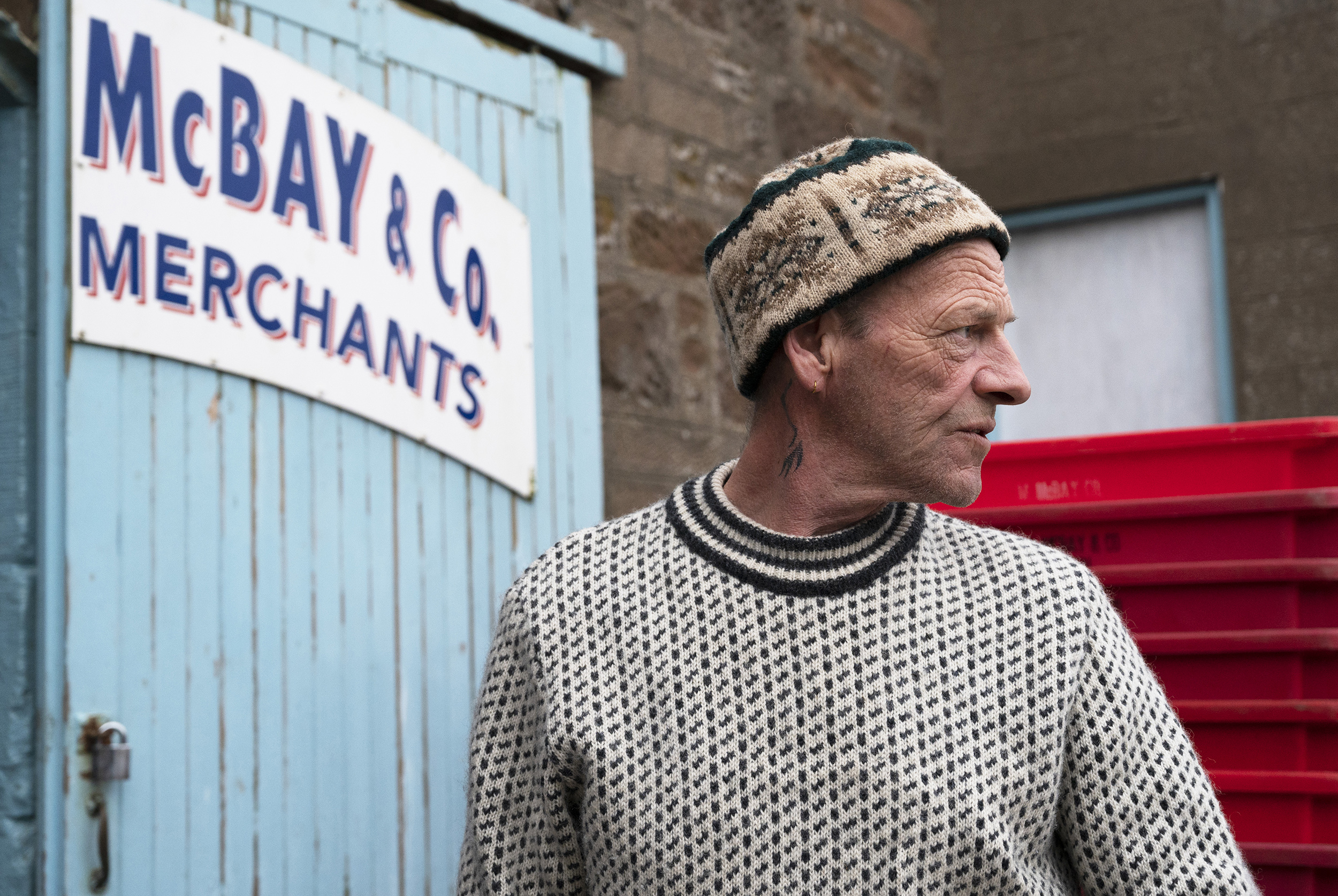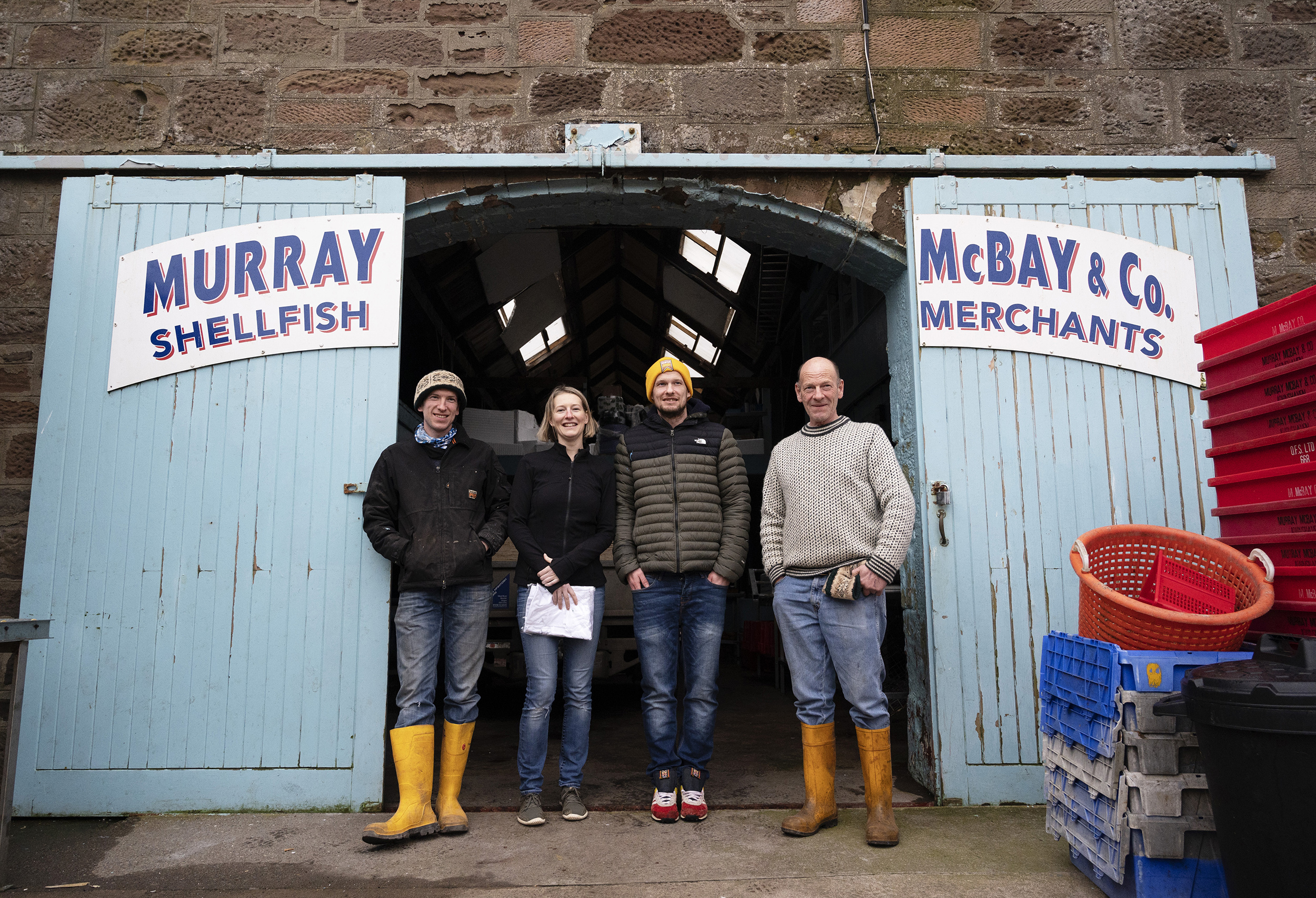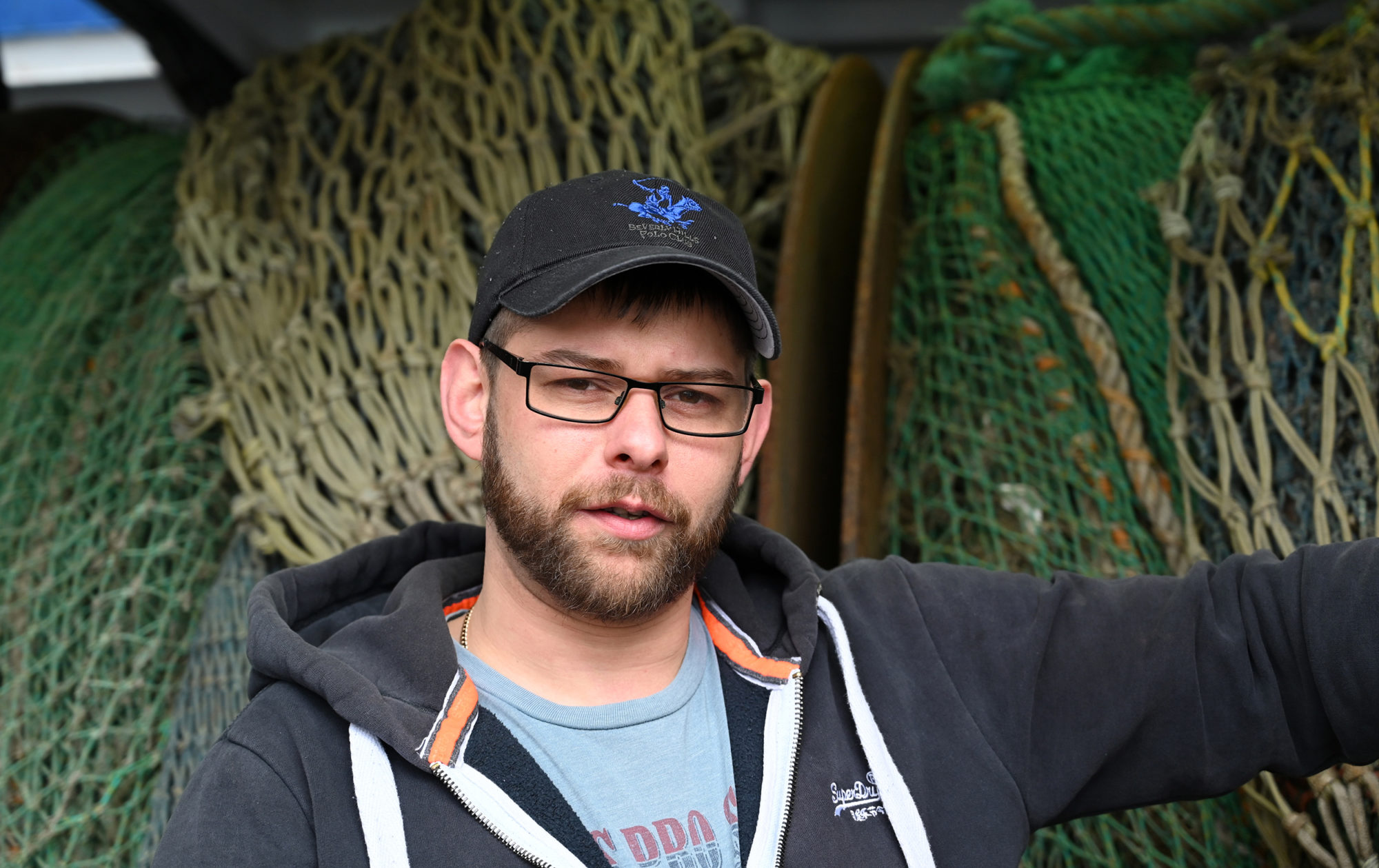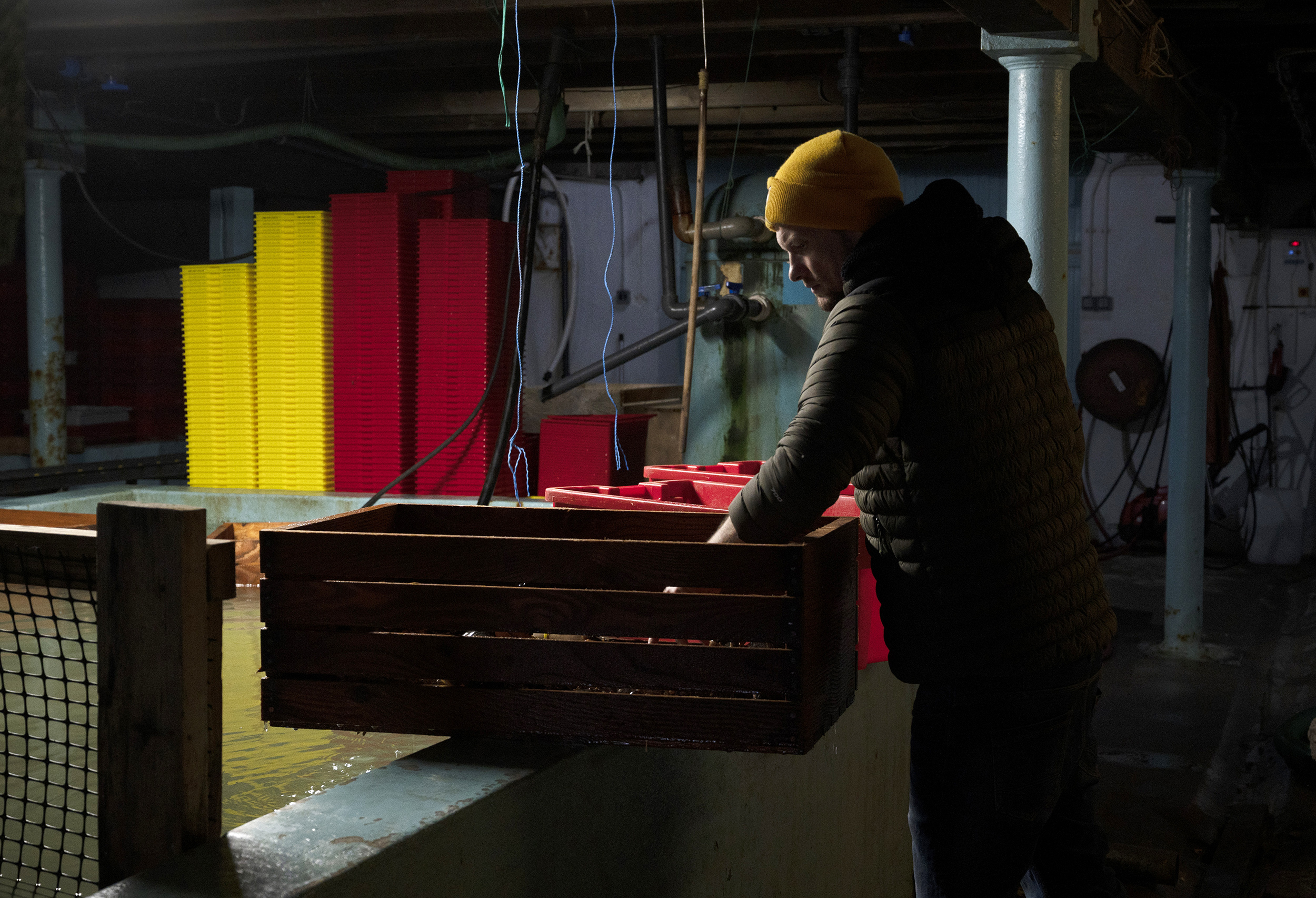Fish and Political Chips
~ by Leah Strong
Stone cottages, yellow rubber boots, rusty lobster traps and the hum of the North Sea’s powerful waves grazing the rocky shore – those are sights and sounds that fill the salty air and scenery of northeastern Scotland’s remote coastal communities.
It’s a region where cars are displaced by docked boats, and family tradition and spirited conversation seem to be everywhere.
In the quaint village of Johnshaven, Loren McBay’s family has been running a lobster shop that has supplied fresh Scottish seafood to the United Kingdom and European Union for over 75 years.

For McBay, the daughter of owner Ivar McBay, the family business is part of who she is.
“It’s funny, because we would come down to the shore as kids and … since you see lobsters all the time, the other kids would come in and they would be petrified by lobsters. For us it was normal,” she said. “You don’t think about it.”
Except now, lobsters and the seafood industry are practically all the McBay family thinks about.
That’s because despite accounting for a mere 0.1% of the U.K.’s gross domestic product, the Scottish seafood industry is once again being used as a strategic chip in an immense political debate- the fight over whether Scotland should declare its independence from Great Britain.
The role being played by the industry is not unlike what occurred six years ago, when arguments began over whether the U.K. should exit the EU- the battle over Brexit.
“Yet again, it’s just politics,” Jimmy Buchan, CEO of the Scotland Seafood Association, said of this latest political skirmish.
Though promised a “sea of opportunity” by political figures of the U.K. Conservative Party, many in the sector have been left in a sea of worry as they continue to combat altered trade agreements and export barriers post-Brexit.
“We used to ship directly to Bergen and Stavanger, but now it has to go to Oslo. It goes out, then comes off the plane, gets cleared by customs and health and other nonsense,” said Ivar McBay.
The murky waters created by Brexit were really nothing new for the industry, which for decades has been regulated by a complex set of rules and requirements on everything from where people could fish to how much they could catch and sell.
When the U.K. joined the EU in 1973, it and other countries became subject to something called the Common Fisheries Policy, or CFP, a set of rules intended to manage fishing fleets and sustain healthy fish stocks in European waters.
Though the U.K. maintained control of national fishing rights in waters up to six nautical miles, common access was given to all EU members in the six-to-12-mile zone.
In 1986, a new regulation was implemented: a system called Total Allowable Catch, which put quotas into effect and regulated fishermen as to how many of certain species they could catch during a season. Quota shares and fishing licenses became tradable commodities, which critics said disadvantaged local Scottish fishermen.
Bureaucratic tensions over shared waters and limited quotas enabled the U.K. exit campaign to position the industry as a symbol of dissatisfaction with the EU.
The campaign included vows made by Conservative U.K. political leaders to deliver radically improved fisheries arrangements. Among the promises were more bountiful fish and sovereign control over U.K. waters.
“They promised us that they would redeem our position in world fisheries on exit,” said Mike Park, CEO of The Scottish White Fish Producers Association, the largest fishing association in Europe. “It was an easy story to tell, getting more fish back for the fishermen and vibrant coastal communities.”
Savvy political slogans like ‘take back control’ and ‘sea of opportunity’ rang in the ears of many Scottish fishermen as they cast their Brexit vote on June 23, 2016.
“I voted to leave because I saw my industry slowly decimating by what I felt were unjustified rules for the greater good of the EU,” said Buchan. “While our fishermen were dying on the vine, had no opportunity, were having to sell off and be squeezed out of our own waters, they were watching the French fishermen come right up to the six-mile fishing. The pie is only the pie, and everybody needs to get a share of the pie. The problem is just how many fingers are in the pie.”

Attitudes concerning Brexit divided the Scottish seafood sector. The so-called “outshore fishermen,” who catch pelagic and white fish such as herring, mackerel, cod and haddock supported Brexit, while the “inshore” shellfish community feared the sustainability of their livelihoods outside the EU market.
“The most important thing for us is access to the EU market. The EU market is by far our biggest customer. We work in shellfish and 99% of our scallops go to the EU,” said Andrew Brown, vice chairman of the Scotland Seafood Association and director of sustainability and public affairs at MacDuff Shellfish.
But Brexit did happen – and with it came a new set of rules for the industry as part of the EU-U.K. Trade and Cooperation Agreement [TCA] signed on December 30, 2020.
Critics contend the new rules on quotas, for example, which will go into effect over the next five years, were not the deal the Scottish fishing industry was promised.
“Does Boris Johnson care about the fishing communities, and you know deeply cherish their well-being and success as opposed to whatever is politically expedient for him? No,” said Anthony Salamone, managing director of the Scottish political analysis firm European Merchants. “I think it was a very convenient tool.”
Dr. Benjamin Martill, lecturer in politics and international relations at the University of Edinburgh maintains that the pledges made to the Scottish fishing community were merely campaign rhetoric and were never going to happen.
“The problem is a lot of these communities had believed in the story of Brexit and the Conservative Party, which is the belief in an exceptional deal that doesn’t exist,” said Martill.
Two years later sentiments of betrayal linger in the Scottish seafood industry.
“At the end of the day we were sold out,” said Park.
Though renegotiations may occur after 2026, the deal comes with a catch, and it’s not more fish.
Under the current arrangements of the Trade and Cooperation Agreement, the U.K. enjoys zero tariffs and zero quotas on all goods exported to the EU. If a dispute arises during renegotiations, then either side can reduce access to waters and place tariffs on fish imports. Or, either side can impose tariffs on any goods, which creates the potential to sink the entire trade agreement between the U.K. and EU.
“It’s a very small industry and the U.K. is simply not going to sacrifice other things for the fishing industry,” said Kim Swales, emeritus professor of economics at The University of Strathclyde.
“They tied trade into the fisheries negotiations. That was it. Game over,” said Park. “No one in their right mind is going to tear up the Trade and Cooperation Agreement for a few extra haddock.”
Park, who is the voice for approximately 1,400 fishermen, said he expects the industry will further consolidate, shrinking the livelihood that has sustained the earliest settlers of Scotland since 7000 B.C.
Those in the shellfish community, like the McBay family, have been hit the hardest by reams of Brexit red tape.
“I swear it’d be easier to get cocaine in the country than seafood trucks,” said Ivar McBay.

Non-tariff regulations post-Brexit require custom checks and extensive paperwork, such as catch certificates, health certificates and customs declarations.
“Politicians really had no understanding of what they were really in for. In fact, they talked about tariffs and things like that, but tariffs weren’t the problem. The problem is the paperwork and the administration of moving outside the EU single market,” said Swales. “All I can say is that the entire thing was very badly thought out.”
Confusion and strict paperwork details have caused transportation delays, something that is detrimental when exporting live product.
Prior to Brexit, government officials advised Loren McBay to prepare their export department for changes, but their business’s “export department” was one person: her aunt, Karen Duncan.
“There is less paperwork and less hassle to [export] to Japan than there is to go to France,” said Duncan.
The McBay’s disdain for Brexit in many ways has been linked to the current political debate – the idea that the industry will improve if Scotland gains its independence from the U.K.
Nicola Sturgeon, first minister of Scotland and leader of the pro-independence Scottish National Party [SNP] has said that the Scottish fishing industry has been “sold out” by the U.K. government – but not everyone is buying that argument.
“This is something that the SNP and others always try to maximize: grievance. For the SNP to say that fishing communities have been ‘sold out’… it is operationalized rhetoric by both sides of the SNP/Conservative political divide,” said Salamone, the political analyst.
Salamone who describes the SNP as a “catch all party” perceives a catch in the party’s rhetoric, that is unlikely to benefit the fishermen.
“At the moment we are in a place where the SNP is really adamant about rejoining the EU, but if you ask them about the Common Fisheries Policy all they say is how much they dislike it. But, in the same breath, they comment on how much they love the EU, which is fascinating domestics that would not work if Scotland actually voted to become independent,” said Salamone. “I think this has the potential to be a contentious issue if Scottish independence were to happen.”
Some in Scotland’s seafood sector are skeptical of Sturgeon given that her party’s stance on rejoining the EU would place them in the very position that led them to favor Brexit.
“I think Nicola Sturgeon is very much yelling at herself… She would take us back into Europe. Europe is where we were from the start. Europe is not going to give us any more fish,” said Buchan.
“We would end up being sold out in the way in, sold out on the way out, and then sold out on the way back in again,” said Park. “The SNP is like an iceberg, what you see on top is not what is underground.”
Others are willing to take a chance in hopes of keeping their businesses afloat.
“If the Scottish government are looking after Scotland, then they are going to put their whole effort into making it work,” said Loren McBay. “But to go through Brexit and have to experience the horrible organization of it, it has been detrimental already. I don’t know how independence could be any worse.”
Where both sides of the debate find common ground is in their frustration with politicians.
“If you were a politician sitting in the chair in front of me, I wouldn’t believe a word that came out of your mouth, because you’re just telling me what I want to hear, then you’ll go through that door and you’ll do the complete opposite because you are willing to do anything to protect your job, to stay in power. It’s taken me 40 years to learn that,” said Buchan.
“At the end of the day, they were politicians and what they’re trying to do is deliver a political end game, and it didn’t matter who got damaged in the process,” said Park.
Said Ivar McBay: “Politics has not changed in the past 1,000 or 2,000 years. The only thing that changes is the person that’s writing the policies. If he’s got the heart to stick by it, he will, but 99.9% of politicians are lying, scheming bastards.”
Some fishermen get less worked up.

Peterhead fisherman Philip Reid who captains the Forever Faithful doesn’t care for or participate in politics. He just wants to fish.
“I didn’t vote. I am focused on what I am doing and when the rulings come out, I just try to work with them,” said Reid.
For Reid fishing is bigger than policies and profit.
“It’s not just a job, it’s a life,” he said.
Reid’s story, like many others in the industry, starts with a grandfather and a boat.
“I grew up in Peterhead, my family has all been fishermen. My grandfather, his father. It really goes back as far as you’d like to go,” said Reid. “My earliest memory was going on boats with my dad when I was probably about 3 years old.”
It’s this rich tradition that has made the Scottish fishing industry an outsized player in the debate over Brexit and now independence.
“You have to be optimistic or else you wouldn’t do the job,” said Reid, who often brings his two daughters and son onboard his boat. “The fishing industry has gone through lots of different things, fuel prices, quotas and technology and it keeps going. You just have to have focus and will.”
Despite the politics affecting it all, Buchan believes in the resiliency of the Scottish fishing industry.
“We’re resourceful people. We’ve been here for generations,” said Buchan. “As long as there is fish in the sea … there will be fishermen.”

~ 04.24.2022